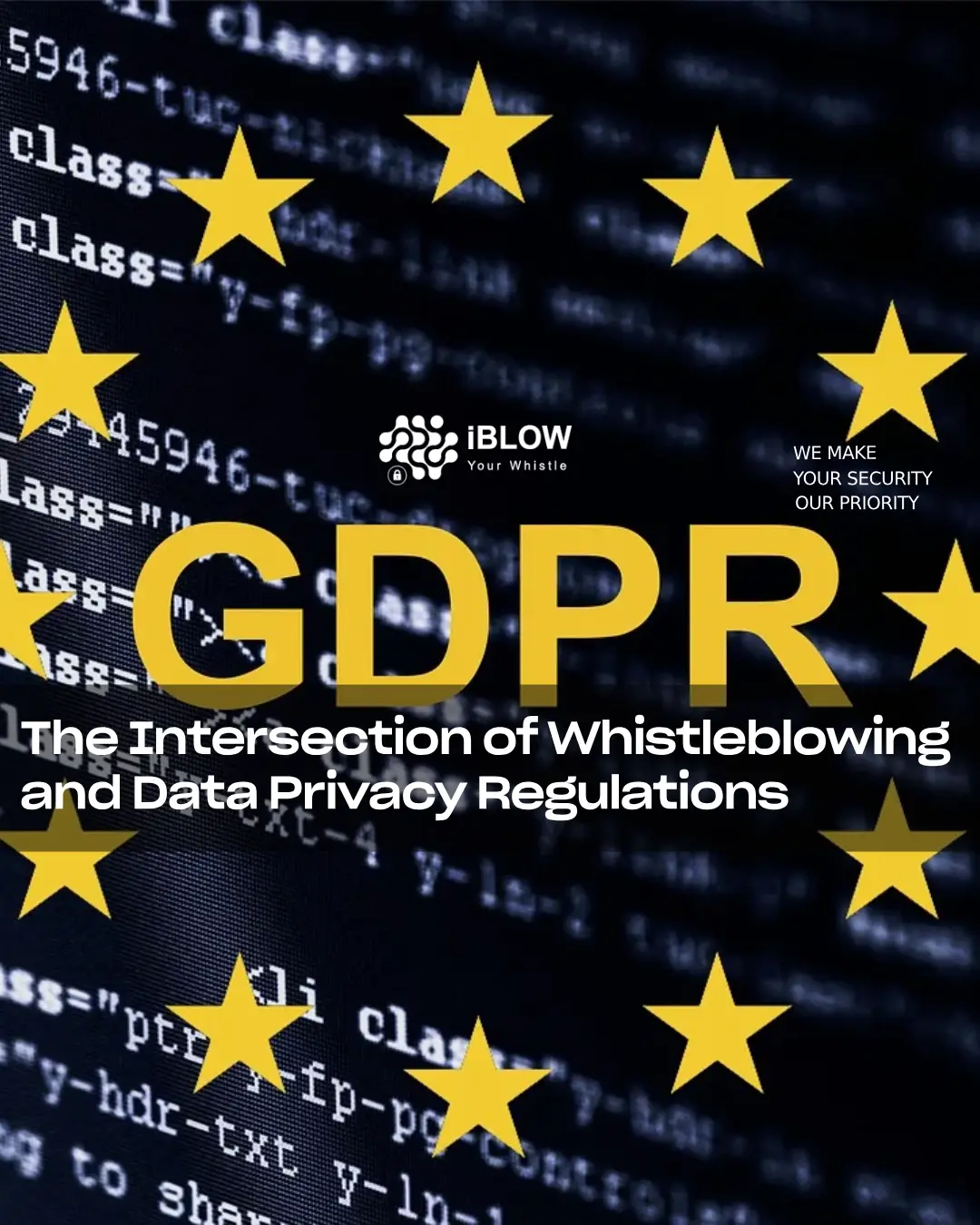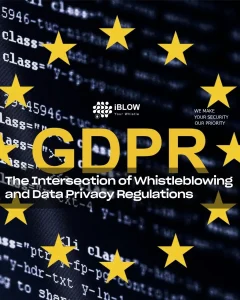Whistleblowing and Data Privacy Regulations
In today’s increasingly regulated corporate environment, organisations across Europe must navigate a complex web of compliance requirements, and, in case of whistleblowing and data privacy regulations, there intersection must be addressed.
Two critical domains that frequently intersect are whistleblowing and data privacy.
With the rise of mandatory whistleblower protection laws across EU member states, and the robust enforcement of the General Data Protection Regulation (GDPR), understanding how these two areas interact has never been more important.
This article explores the relationship between whistleblowing and data protection regulations, particularly GDPR, offering practical guidance for organisations to ensure that their internal reporting channels are compliant with European privacy standards.
Why Whistleblowing and Data Privacy Regulations Must Align
Whistleblowing is a crucial mechanism for uncovering and addressing misconduct within organisations, ranging from corruption and fraud to harassment and environmental violations.
However, collecting, processing, and storing reports—often containing sensitive personal data—must be done in full compliance with privacy regulations.
In the European Union, the GDPR governs the handling of personal data.
Its principles apply to whistleblowing procedures in the same way they apply to any other data processing activity.
This means that companies must carefully manage how they receive, process, and retain whistleblower reports and the data they contain.
Failing to do so not only puts the whistleblower and other involved parties at risk but can also lead to significant financial penalties and reputational damage for the organisation.
Key GDPR Principles Relevant to Whistleblowing
The GDPR sets out several core principles that must be observed when handling personal data, including in the context of whistleblowing:
-
Lawfulness, Fairness, and Transparency
Whistleblower reports must be collected and processed in a lawful and fair manner.
While GDPR generally requires that individuals are informed about how their data is being used, in whistleblowing cases, some exceptions apply.
For instance, if notifying a subject would compromise the investigation or expose the whistleblower to risk, an exemption may be allowed—but only with proper justification.
-
Purpose Limitation
Personal data collected through whistleblowing mechanisms should be used strictly for investigating the reported issue.
Repurposing the data for unrelated uses (such as performance evaluations or disciplinary reviews outside the scope of the original report) is a breach of GDPR.
-
Data Minimisation
Only data that is necessary for investigating the claim should be collected.
Organisations should avoid recording unnecessary or excessive details that are not directly relevant to the case.
-
Accuracy
All personal data collected must be accurate and kept up to date.
If the investigation finds that certain details are incorrect, these should be corrected or removed without delay.
-
Storage Limitation
Personal data should not be retained longer than necessary.
Once an investigation is concluded and there is no further legal justification for retaining the data, it should be securely deleted or anonymised.
-
Integrity and Confidentiality
This is especially crucial for whistleblowing.
Organisations must protect whistleblower reports from unauthorised access, accidental loss, or disclosure.
Data encryption, restricted access, and secure reporting systems are essential.
Anonymity vs. Confidentiality
There is often confusion between anonymity and confidentiality in whistleblowing mechanisms.
- Anonymity means that the identity of the whistleblower is not known to the organisation at all. GDPR does not explicitly require anonymous reporting, but it must be permitted under national laws or company policies where relevant.
- Confidentiality, on the other hand, means that while the whistleblower’s identity is known to designated persons, it is not disclosed further without their consent—except where legally necessary.
GDPR requires strict controls over access to whistleblower identities, whether reports are anonymous or not.
In fact, Recital 39 of GDPR underlines the importance of protecting identity as a key component of lawful and fair data processing.
Legal Bases for Processing Whistleblower Data
Under GDPR, any data processing activity must be based on a legal basis.
In whistleblowing scenarios, the most applicable bases include:
- Legal Obligation – If an organisation is legally required to maintain a whistleblowing channel (as per the EU Whistleblower Directive), the processing of personal data involved in managing that system is grounded in legal obligation.
- Legitimate Interest – For organisations not strictly required to maintain such a system, the legal basis might be their legitimate interest in preventing misconduct or complying with ethical standards. However, this must be balanced against the rights of the data subject.
- Public Interest – In some cases, particularly within public sector institutions, processing may be necessary for a task carried out in the public interest.
Consent is generally not considered an appropriate basis for processing whistleblower data, as the power imbalance between employee and employer can render it invalid under GDPR.
Data Subjects’ Rights and Whistleblowing
GDPR grants data subjects a range of rights, such as the right to access, rectify, or delete their personal data.
However, when it comes to whistleblowing, these rights may be limited in order to safeguard the investigation and protect the identity of the whistleblower.
For example:
- A person accused in a whistleblower report (the “reported party”) has the right to be informed and to access data held about them—but only once it is safe to do so and does not undermine the investigation.
- The whistleblower themselves has the right to know how their data is being processed, unless the anonymity option has been chosen.
Organisations must clearly define in their whistleblowing policy how they will balance these competing rights and ensure transparency to the extent possible.
How to Ensure GDPR-Compliant Whistleblowing Mechanisms
-
Implement a Clear Policy
Organisations should have a written whistleblowing policy that outlines procedures, confidentiality safeguards, data handling processes, and the rights of all parties involved.
This policy should also include GDPR-specific provisions.
-
Use Secure and Compliant Reporting Tools
Digital whistleblowing platforms used by companies must be GDPR-compliant.
This includes having proper encryption, audit logs, access restrictions, and secure data storage within the EU.
-
Conduct Data Protection Impact Assessments (DPIA)
If a whistleblowing system is likely to pose a high risk to the rights and freedoms of individuals, a DPIA must be conducted.
This is particularly relevant when dealing with sensitive personal data or large-scale processing.
-
Ensure Role-Based Access Controls
Only authorised personnel should have access to whistleblower data.
These individuals must be trained in both investigation procedures and data privacy obligations.
-
Train Staff and Promote Awareness
Everyone involved in handling whistleblower reports—HR teams, compliance officers, legal counsel—should be trained on data protection obligations.
Regular training reinforces best practices and minimises the risk of accidental breaches.
-
Maintain Records and Documentation
GDPR requires accountability. Keep detailed records of how whistleblower data is handled, including when it is received, who accessed it, when it was deleted, and under what justification.
-
Establish Clear Retention Periods
Define and document how long whistleblower data will be kept and ensure systems are in place for its secure deletion once that period has passed.
The Role of Data Protection Officers (DPOs)
In larger organisations or those handling sensitive data regularly, appointing a Data Protection Officer (DPO) is not only recommended—it may be mandatory.
The DPO plays a vital role in ensuring that whistleblowing channels respect privacy laws and that any data processing is legally justified and properly documented.
National Variations in Implementation
While GDPR provides a harmonised framework, member states have implemented the EU Whistleblower Protection Directive with slight variations, particularly in how anonymity, reporting channels, and public disclosures are managed.
Organisations operating across borders must adapt their whistleblowing processes to local legislation in each country where they operate.
Portugal, for instance, transposed the EU Directive through Law no. 93/2021, which obliges certain companies to have secure and confidential reporting mechanisms and outlines specific protections for whistleblowers.
Conclusion: Finding the Balance between Whistleblowing and Data Privacy Regulations
The intersection between whistleblowing and data privacy regulations presents both a challenge and an opportunity.
When implemented correctly, a whistleblowing system can foster transparency, accountability, and ethical behaviour, while also respecting the rights and privacy of all individuals involved.
Organisations that proactively align their whistleblowing mechanisms with GDPR principles not only reduce the risk of penalties and reputational damage but also build trust with employees, customers, and the public.
In a regulatory landscape that continues to evolve, staying compliant is not merely a legal necessity—it’s a strategic advantage.
Be part of the conversation that is shaping the future of work! Book a meeting!
See other articles that may be of interest to you.
We hope you enjoyed this article.
Thank you!
Constantino Ferreira
iBlow.eu
![]() Liked? Subscribe to receive future articles
Liked? Subscribe to receive future articles
Published: 2025.05.07


